Year 11
Welcome to the Year 11 section of our school website!
This page has been created to provide both students and parents with everything they need as they approach and journey through the important final year of secondary school. Whether you’re one of our student’s looking for revision tips, exam timetables, or guidance on managing stress, or you are a parent supporting your child through the exam season, you'll find all the essential information here.
In this section, you'll find key information on, revision strategies, the exam schedule, exam boards and specification plus the P6 (after-school) sessions. We’ve also included advice for parents on how to best support their child during this crucial time, as well as resources to support health and well-being throughout the exam period.
Additionally, we’ve included detailed information for each subject, helping students to stay on top of their studies and prepare effectively for their exams. We hope you find this page helpful and informative as you navigate Year 11!
Year 11 Spring Exam Timetable
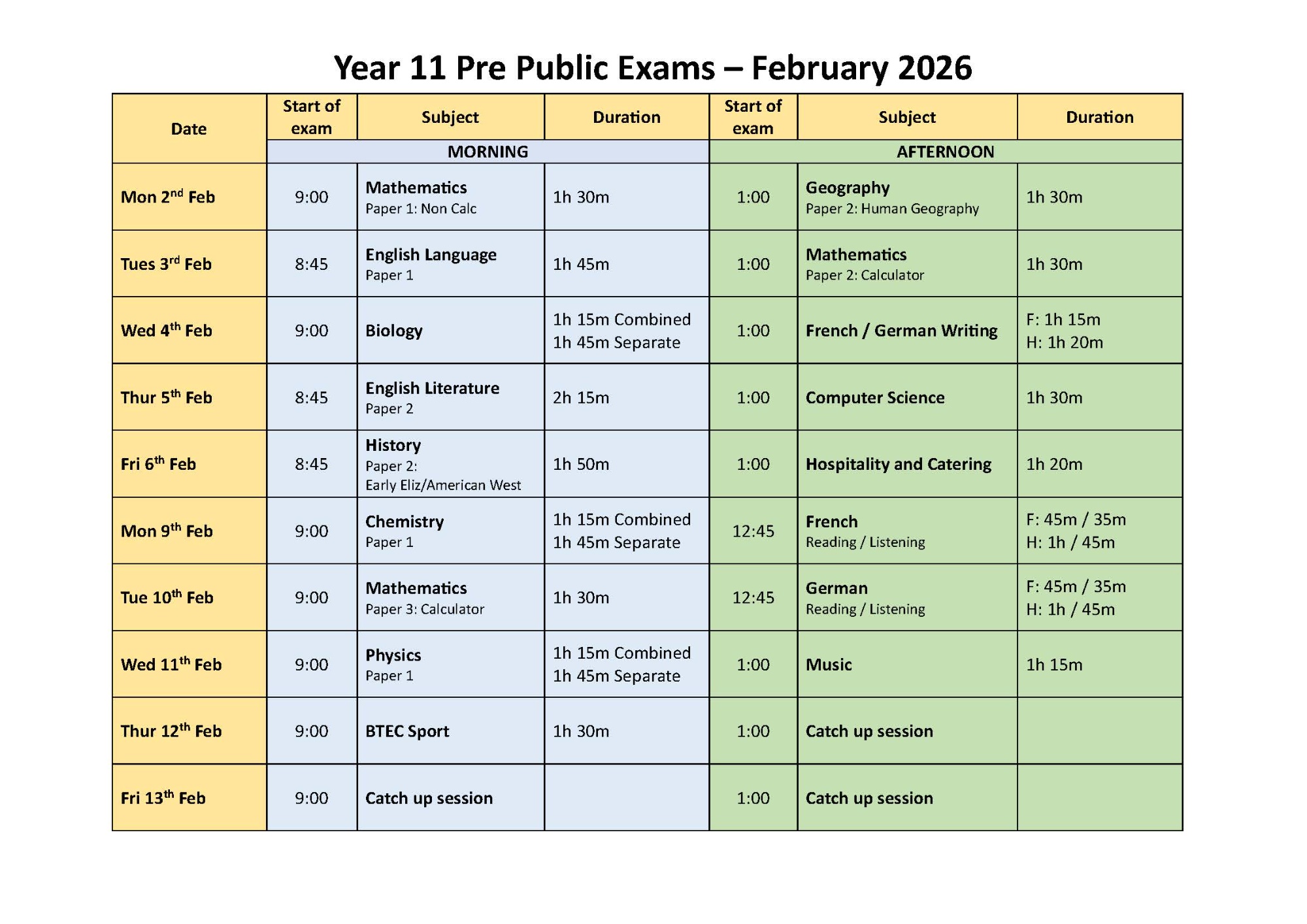
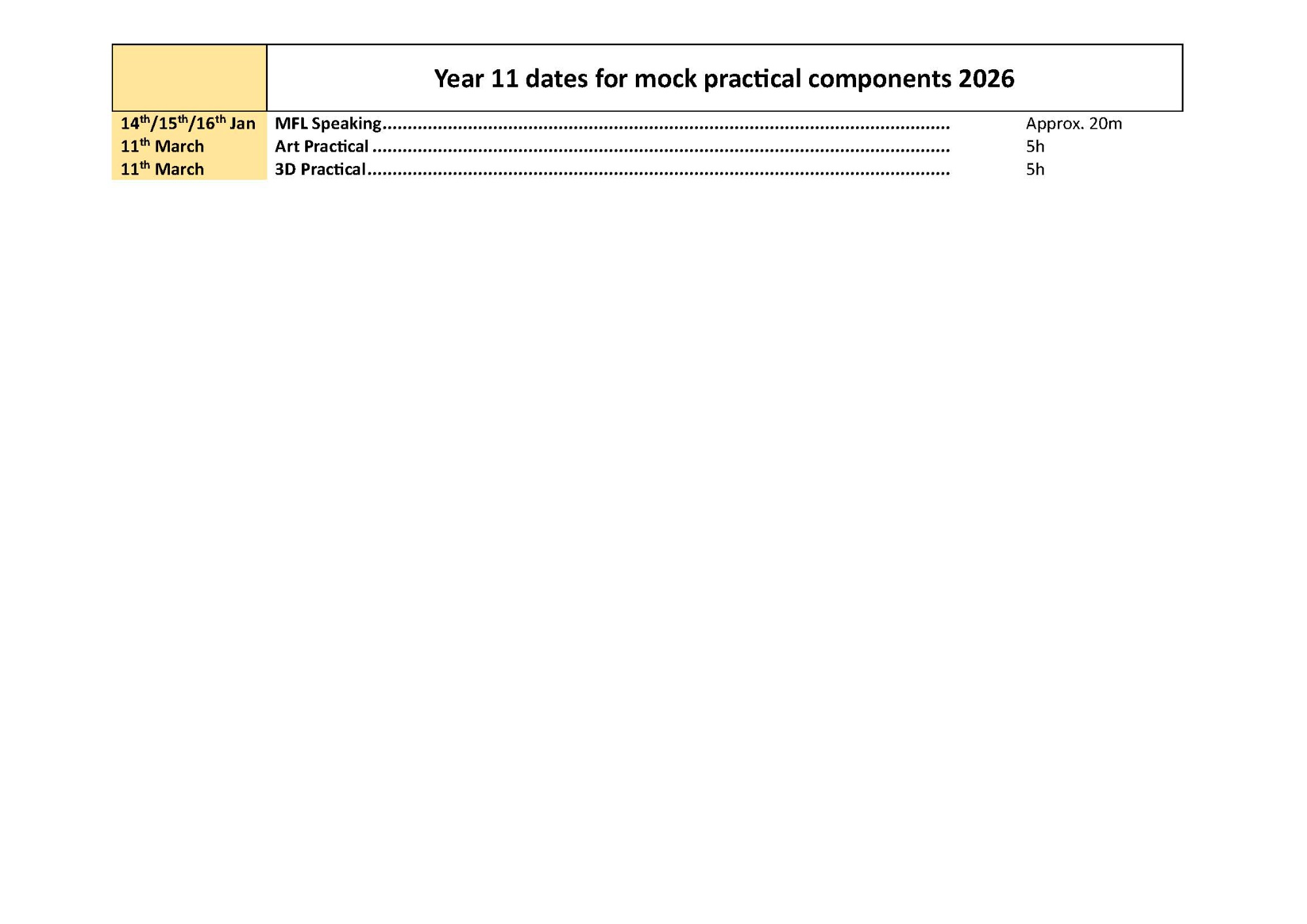
Subject Resources
Art
Year 11 Art Resources
BTEC PE
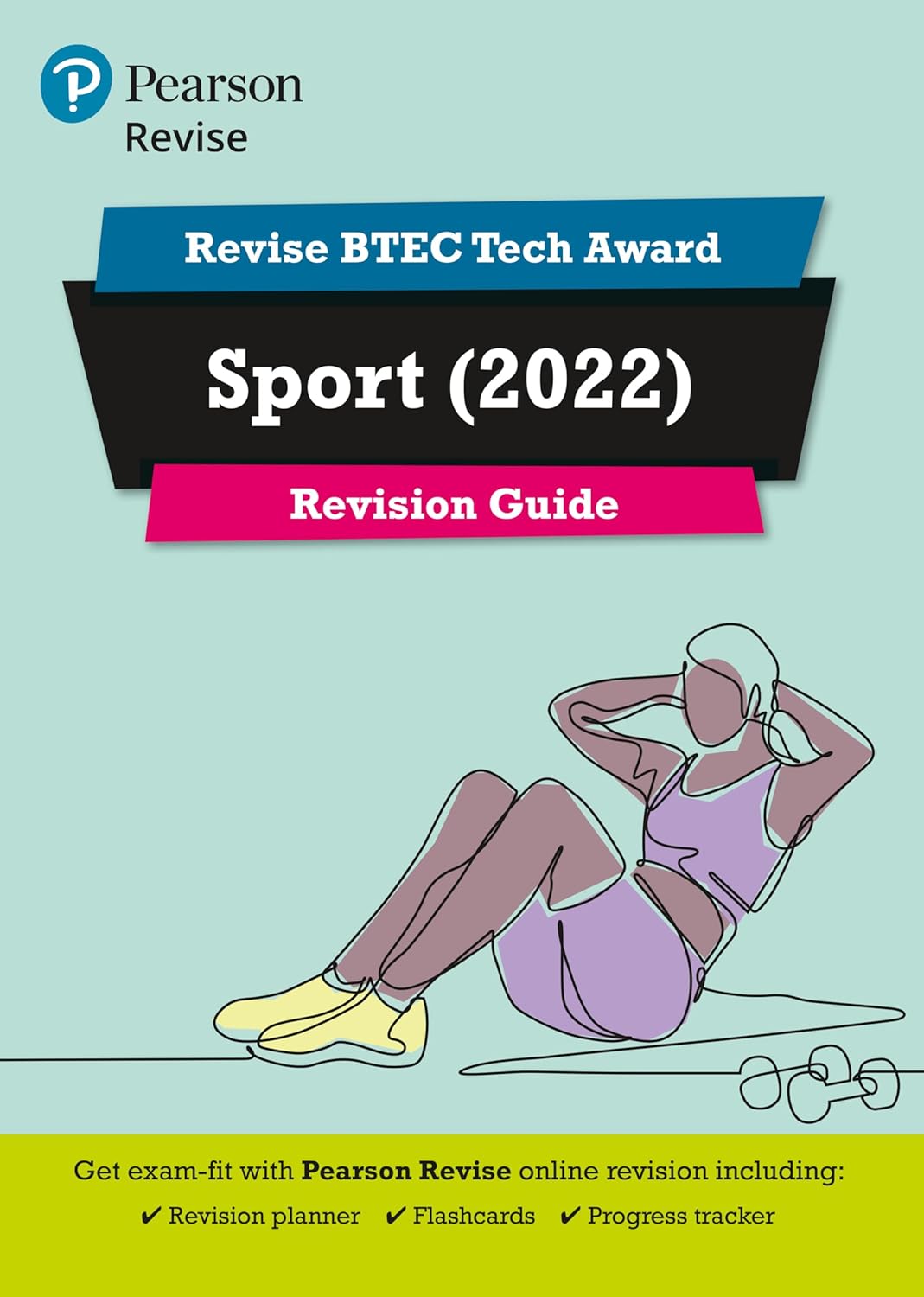
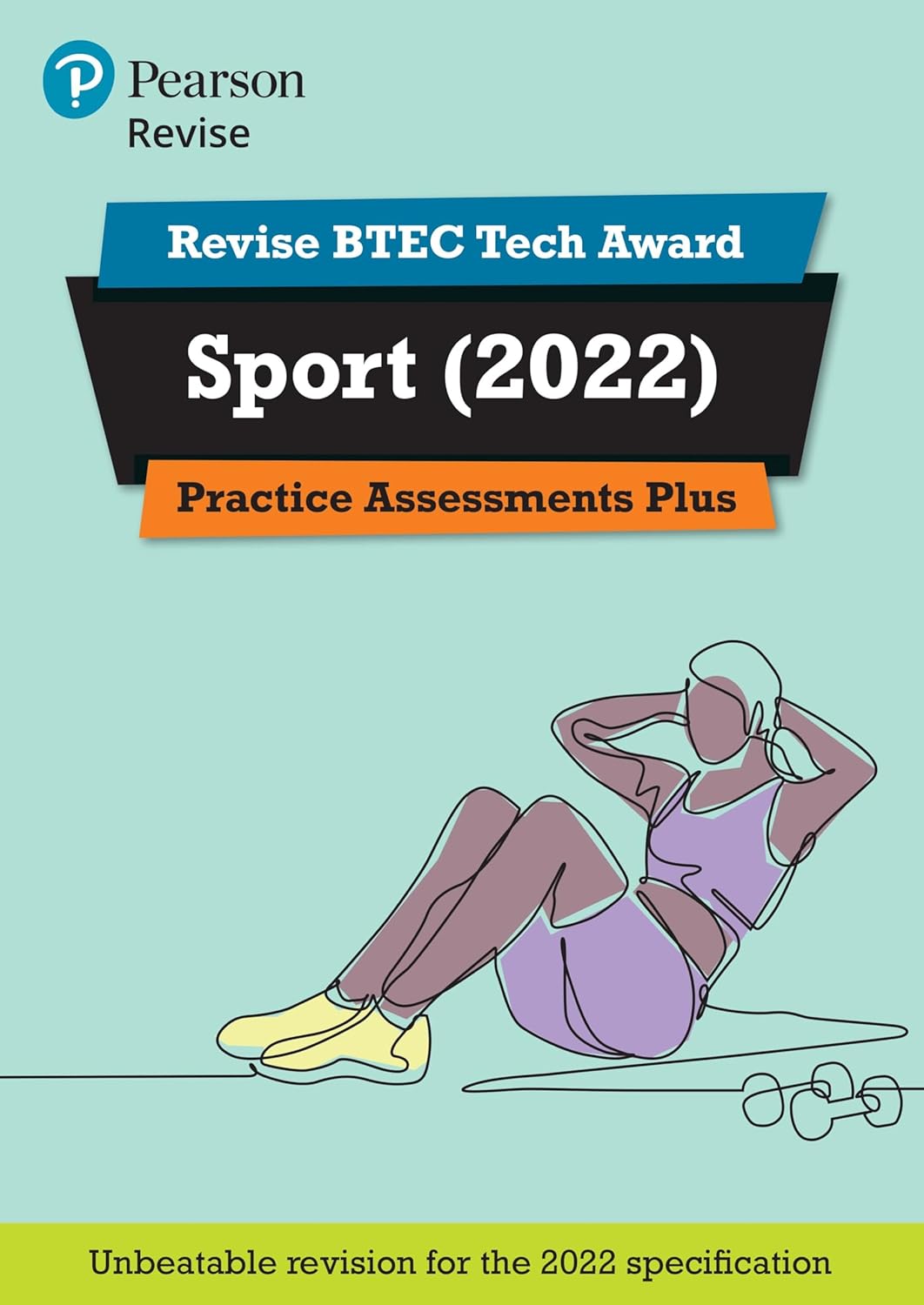
Pearson REVISE BTEC 2022 Tech Award Sport Revision Guide inc online edition - for 2026, 2027 exams: Amazon.co.uk: Brown, Jenny: 9781292436142: Books
Pearson REVISE BTEC 2022 Tech Award Sport Practice Assessments Plus - for 2026, 2027 exams: Amazon.co.uk: Brown, Jenny: 9781292436302: Books
Design Technology
Year 11 3D Resources
Catering
Year 11 Catering Resources
Computer Science
Computer Science Mini Revision BookletYear 11 Computer Science Resources
Drama
Year 11 Drama Resources
English Language and Literature
Year 11 English Resources
- English Language Paper 1
- English Language Paper 2
- English Literature Paper 1
- English Literature Paper 2
- English Literature Power and Conflict Poetry Revision
Geography
History
Maths
Year 11 Maths Resources
MFL
Science
- Combined Past Papers
- 16 May 2023
- 9 June 2023
- 22 May 2023
- 13 June 2023
- 25 May 2023
- 16 June 2023
- Separate Science Past Papers
- 16 May 2023
- 9 June 2023
- 22 May 2023
- 13 June 2023
- 25 May 2023
- 16 June 2023
Year 11 Parental Engagement Evenings
Top 10 GCSE Revisions Tips
GCSEs can feel overwhelming, but with the right strategies, students can revise effectively and stay on track. Whether you're a student preparing for exams or a parent supporting your child, these top ten revision tips will help make the process smoother and more productive.
- Create a Realistic Revision Timetable 📅
- Use Active Revision Techniques 📝
- Take Regular Breaks ⏳
- Revise Past Papers Under Timed Conditions 🏆
- Minimise Distractions 🚫📱
- Stay Active and Eat Well 🍏🏃♂️
- Get Enough Sleep 😴
- Use Online Resources Wisely 🌐
- Stay Positive and Manage Stress 😊
- Plan Rewards and Celebrate Progress 🎉
1. Create a Realistic Revision Timetable
A well-structured plan prevents last-minute cramming and reduces stress. Students should allocate time for each subject, ensuring a balance between their strongest and weakest areas. Parents can help by encouraging consistency and offering gentle reminders.
2. Use Active Revision Techniques
Simply reading notes isn’t enough. Encourage students to:
✔ Use flashcards for key facts and definitions.
✔ Create mind maps to link concepts together.
✔ Teach topics to a friend or family member.
3. Take Regular Breaks
Studying for hours without a break leads to fatigue. The Pomodoro technique (25-minute study sessions followed by a 5-minute break) can boost concentration. Parents can support by promoting a healthy balance of work and rest.
4. Revise Past Papers Under Timed Conditions
Practising with past papers improves exam technique and builds confidence. It helps students familiarise themselves with the question format and mark schemes. Parents can assist by timing practice exams and discussing results.
5. Minimise Distractions
A quiet, organised workspace is essential. Encourage students to put their phone on silent or use apps like Forest or Cold Turkey to block social media during study sessions.
6. Stay Active and Eat Well
Exercise boosts brain function and reduces stress. Eating brain-friendly foods like nuts, fish, and fruits can improve concentration. Parents should encourage healthy snacks and ensure their child gets enough movement during the day.
7. Get Enough Sleep
Sleep is crucial for memory retention. Aim for at least 8 hours of sleep each night. Avoid last-minute, late-night cramming, as it can do more harm than good. Parents can support by setting a good sleep routine.
8. Use Online Resources Wisely
Websites like BBC Bitesize, Seneca, and GCSEPod provide excellent revision materials. However, social media and YouTube should be used carefully—stick to educational content rather than getting distracted.
9. Stay Positive and Manage Stress
Exams can be stressful, but a positive mindset makes a huge difference. Parents should reassure their child that effort matters more than perfection. Relaxation techniques like deep breathing or meditation can help.
10. Plan Rewards and Celebrate Progress
Setting small goals and rewarding achievements keeps motivation high. Whether it’s a favourite snack, a short break, or a day out after exams, having something to look forward to can keep students going.
Final Thoughts
GCSE revision doesn’t have to be overwhelming. With a structured plan, active learning, and plenty of support, students can approach exams with confidence. Parents play a key role in encouraging and guiding their child through this crucial time.
Good luck to all students! 🎓📚
ccordion content
Learning/Revision Techniques
There is no right or wrong way to do your revision - we all process information differently, whether it be through images and drawings, listening to podcasts or writing the information down. Click the links below for useful hints and tips to help with your revision.
- Revision techniques
- Understanding your learning style
- Dual Coding: Combining both words and visuals
- Interleaving: Revising more than one topic in each revision session
- Retrieval Practice: Recalling information without having it in front of you
- Spaced Practice: Short, sharp bursts of learning
Revision Technique videos
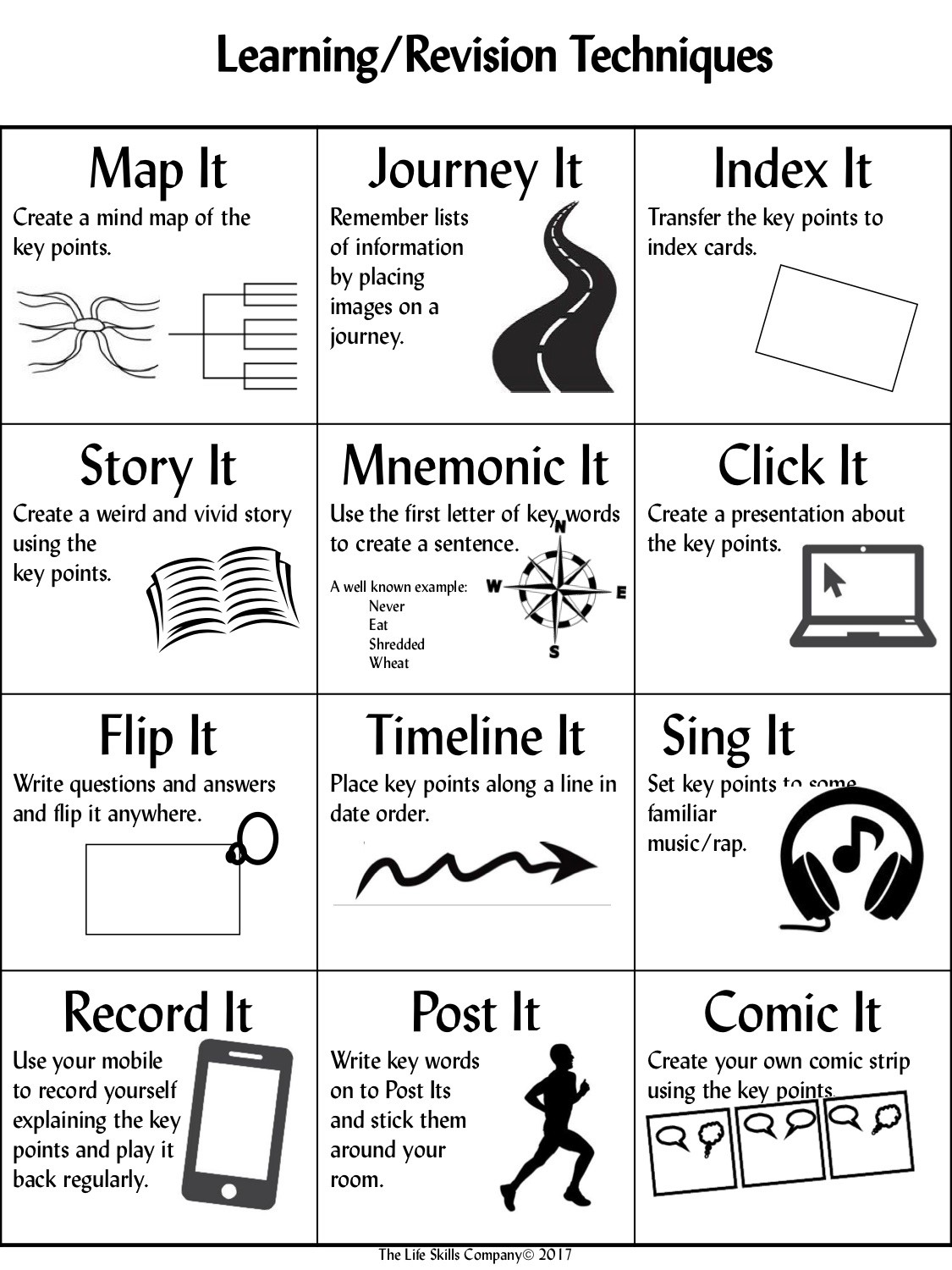
Year 11 Well-Being Section
Coping with Exam Stress and Anxiety
Year 11 can be an exciting yet challenging time, with exams approaching and many things to juggle. It's completely normal to feel stressed or anxious, but it's important to remember that taking care of your mental health is just as important as preparing for your exams. When stress and anxiety begin to feel overwhelming, there are strategies you can use to help manage these feelings and take control of your well-being.
Taking time for self-care, maintaining a balanced routine, and seeking support when needed can make a big difference in your exam preparation and overall mental health. Here are 10 things you can do to help reduce the impact of stress and anxiety during your Year 11 journey:
- Take regular breaks: Don’t overwhelm yourself with non-stop studying. Take short breaks every hour to refresh your mind and body.
- Get plenty of sleep: Try to get 8 hours of sleep a night. Sleep is essential for memory retention and mental focus.
- Eat well: A balanced diet can boost your energy and mood. Include plenty of fruits, vegetables, and water in your daily intake.
- Exercise regularly: Physical activity is a great way to reduce stress. Even a short walk or a quick workout can help clear your mind.
- Practice mindfulness and relaxation: Techniques like deep breathing, meditation, or yoga can help you feel calm and centred.
- Stay organised: Keep track of your exam dates, deadlines, and study plans. Being organised can reduce feelings of overwhelm.
- Talk about your feelings: If you’re feeling anxious, talk to someone you trust – a teacher, a parent, or a friend. You don’t have to go through it alone.
- Limit screen time: Excessive screen time, especially on social media, can increase stress. Limit your time on screens and focus on more calming activities.
- Stay positive: Try to maintain a positive mindset and remind yourself that you’ve already learned a lot. Believe in your ability to succeed!
- Ask for help when you need it: Don’t be afraid to reach out for support, whether it’s for schoolwork or emotional well-being. You’re not alone.
If you’re feeling particularly stressed or anxious, here are a few helpful websites you can visit for further advice and support, and remember you can talk to Sandie, Ms Precious or anyone in school. We are all available to you.
- Young Minds: https://youngminds.org.uk/ – A charity that provides resources for young people struggling with mental health.
- Mind: https://www.mind.org.uk/ – Offers support for anyone feeling stressed, anxious, or overwhelmed.
- NHS – Mental Health Support: https://www.nhs.uk/mental-health/ – A guide to mental health support from the NHS.
- Headspace: https://www.headspace.com/ – A mindfulness and meditation app to help with stress management.
- BBC – Coping with exam stress: https://www.bbc.co.uk/bitesize/articles/zdg8scw – Practical tips for managing exam stress.
Remember, it’s okay to feel stressed or anxious, but don’t let it control you. By taking small steps to care for your well-being, you can feel more in control and ready to tackle Year 11 with confidence. You’ve got this!

